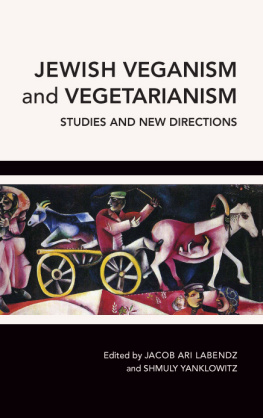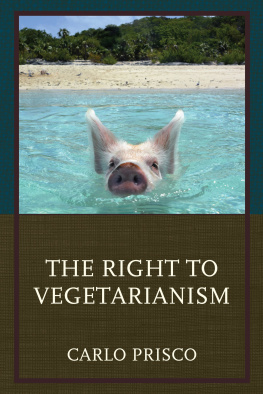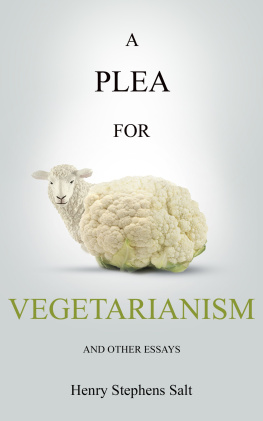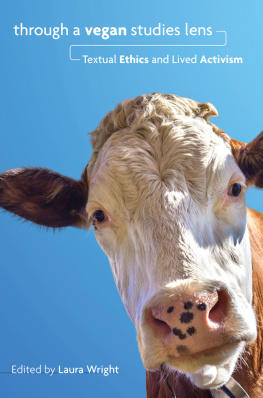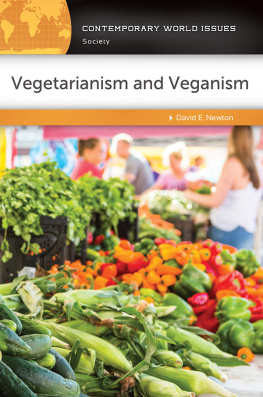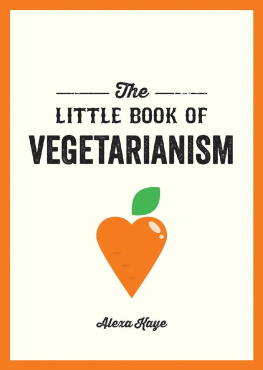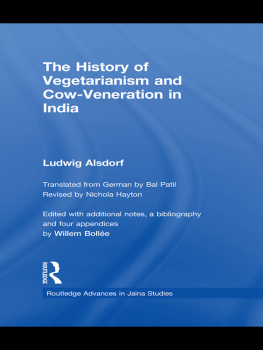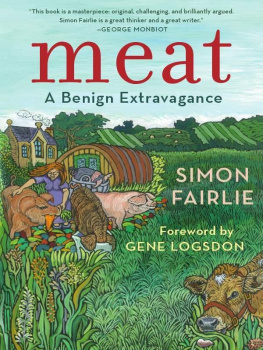JEWISH VEGANISM AND VEGETARIANISM
JEWISH VEGANISM
and VEGETARIANISM
STUDIES AND NEW DIRECTIONS
Edited by Jacob Ari Labendz
and Shmuly Yanklowitz
Cover: Marc Chagall, The Cattle Dealer , 1912, oil on canvas
Published by State University of New York Press, Albany
2019 State University of New York
All rights reserved
Printed in the United States of America
No part of this book may be used or reproduced in any manner whatsoever without written permission. No part of this book may be stored in a retrieval system or transmitted in any form or by any means including electronic, electrostatic, magnetic tape, mechanical, photocopying, recording, or otherwise without the prior permission in writing of the publisher.
For information, contact State University of New York Press, Albany, NY
www.sunypress.edu
Library of Congress Cataloging-in-Publication Data
Names: Labendz, Jacob Ari, 1977- editor. | Yanklowitz, Shmuly, 1981- editor.
Title: Jewish veganism and vegetarianism : studies and new directions / edited by Jacob Ari Labendz and Shmuly Yanklowitz.
Description: Albany, New York : State University of New York Press, [2019] | Includes bibliographical references and index.
Identifiers: LCCN 2018027702 | ISBN 9781438473611 (hardcover : alk. paper) | ISBN 9781438473628 (e-book)
Subjects: LCSH: VegetarianismReligious aspectsJudaism. | VeganismMoral and ethical aspects. | Jewish ethics.
Classification: LCC BM538.V43 J49 2019 | DDC 296.3/693dc23 LC record available at https://lccn.loc.gov/2018027702
10 9 8 7 6 5 4 3 2 1
CONTENTS
Jacob Ari Labendz and Shmuly Yanklowitz
Beth A. Berkowitz
Nick Underwood
Irad Ben Isaak
Hadas Marcus
Michael Croland
Adrienne Krone
Victoria Greenstone and Shlomi Shmuel
David Mevorach Seidenberg
Geoffrey D. Claussen
Richard H. Schwartz and David Sears
Alan D. Krinsky
Shmuly Yanklowitz
Sherry F. Colb
Jacob Ari Labendz
Sarah Chandler and Jeffrey Cohan
Aaron S. Gross
PRAISE FOR JEWISH VEGANISM AND VEGETARIANISM
Whether looking at the pages of the Talmud, vegetarian poems written in Yiddish, lyrics written by Jewish punk rockers, or into a pot of vegan matzo ball soup, this book explores the many ways in which Jews have questioned the ethics of eating animals. Labendz and Yanklowitz achieve their stated goal of exploring what distinguishes Jewish veganism and vegetarianism as Jewish. You do not have to be a vegetarian or a vegan (or Jewish!) in order to learn from, and indeed grapple with, the many questions, dilemmas, and readings that the contributors raise.
Jordan D. Rosenblum, author of The Jewish Dietary Laws in the Ancient World
Jewish Veganism and Vegetarianism offers theological, pragmatic, ethical, environmental, and other ways to view non-meat eating as a viable, healthy, and holy Judaic strategy to consume the world. Anyone who eats or thinks about eating should take this volume seriously.
Rabbi Jonathan K. Crane, author of Eating Ethically: Religion and Science for a Better Diet
ILLUSTRATIONS
INTRODUCTION
Considering Jewish Veganism and Vegetarianism
JACOB ARI LABENDZ AND SHMULY YANKLOWITZ
JEWISH VEGANISM AND VEGETARIANISM
This volume reflects the studied intuition that Jewish veganism and vegetarianism have come of age. Jewish vegans and vegetarians have formed organizations and online forums to advocate within their communities and beyond and to develop, debate, and promote animal-product- and meat-free Jewish cultures. Jewish people have also counted among the most prominent vegan activists, such as Mayim Bialik, a founding member and senior leadership consultant at the Shamayim VAretz Institute, and Academy Award-winning actor Natalie Portman.
This collection of essays by scholars, rabbis, activists, and community leaders explores the history, contours, and scope of veganism and vegetarianism among Jews and presents compelling new directions in Jewish thought, ethics, and foodways. As ever more Jews adopt vegan and vegetarian lifestyles, and thereby join movements that transcend the porous boundaries of Jewish communities, this volume asks what distinguishes Jewish veganism and vegetarianism as Jewish. It offers opportunities to meditate on the varied intellectual, cultural, and religious roots of these movements across centuries and continents. Jewish Veganism and Vegetarianism asks how Judaism, broadly considered, has inspired Jews to embrace such practices and how those lifestyles in turn have enriched and helped define Jewishness. This collection of essays tests the boundaries of Jewish veganism and vegetarianism and calls attention to divisions within those dynamic movements, along with some of the resistance they have faced.
Studies of Jewish veganism and vegetarianism, such as those that fill this volume, offer insights into Jewish culture and history that go beyond culinary and dietary spheres. We have learned from the growing field of food studies that examining how and what groups eat, as well as how they conceptualize their foods, can open vistas into their cultures and social worlds. Attention to how and why foodways change can help us mark, characterize, and account for broader sociocultural transformations. This is because foodwayscultures of food production and consumptionare central to how groups work. The provision of food rests at the foundation of society, economies, and politics. Anthropologist Mary Douglas has shown that how groups think about, distribute, and consume food can simultaneously reflect and produce their values and social structures. Studies of foodways can thus inform how we consider a broader range of issues related to Jewish life. The essays that follow situate Jewish veganism and vegetarianism in discussions of food politics, animal rights and welfare, social justice, environmentalism, Jewish identity, cultures of (Holocaust) memory, nationalism, and religion.
WHATS JEWISH ABOUT VEGANISM? WHATS VEGAN ABOUT JEWISHNESS?
Behold I give to you all the vegetation that sprouts seed which is upon the face of all the earth, and every tree in which the fruit of the tree sprouts seed, for you it shall be as food. And to all the animals of the earth and to all the birds of the sky and to all that creeps on the earth, in which there is life, [I give] all the green vegetation for food.
Genesis 1:2930
And the wolf will dwell with the sheep, and the leopard will lie down with the kid, and the calf and the young lion and the fatling together, with a young lad leading them. And the cow and the bear shall graze, together their young shall lie down, and the lion shall eat straw like the ox.
Isaiah 11:67
The wolf and the lamb will graze together, and the lion shall eat straw like the ox they shall not do evil and they shall not destroy in all my holy mountain, says the Lord.
Isaiah 65:25
As demonstrated by the quotes from Genesis and Isaiah reproduced in his work and above, not only do humans in the Garden of Eden and in the Days of the Messiah survive on vegetables alone, so too do all animals, including those known as omnivores and carnivores. Of course, the Tanakh also makes clear that the foodways and rituals of ancient Israel depended on animal agriculture and meat consumption. Rendsburg thus argues further that the restrictions on such practiceswhich evolved into the laws of kashrut reflect a divine concession or a compromise with God:

